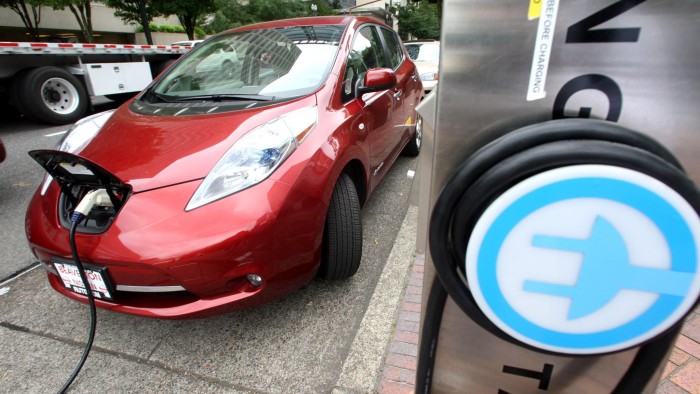Innovators run into regulatory hurdles

Roula Khalaf, Editor of the FT, selects her favourite stories in this weekly newsletter.
Would you drive an electric car? That is the question budding auto entrepreneurs have been battling for years.
But having finally won over consumers, companies are now facing new, regulatory hurdles. Tesla Motors, founded by serial entrepreneur Elon Musk, may have won a loyal following but it has run into opposition in its home market, with the states of Texas, Arizona and New Jersey blocking its moves to sell direct to consumers and bypass conventional dealerships.
Tesla is far from alone. By their nature, innovative ideas threaten the status quo, while start-up companies often feel overburdened by regulations. Last year, for example, the EY G20 Entrepreneurship Barometer, published by EY, the professional services firm, revealed that 38 per cent of entrepreneurs would like a channel to voice concerns on business regulations.
Other tech innovations that have run into regulatory issues recently include Airbnb, the website that allows users to let rooms and houses to holidaymakers, and Uber, the cab hailing app. While both ventures have proved popular with consumers worldwide, local lawmakers have been less welcoming. Uber, for example, is facing a court battle in London and has been banned in Brussels.
FT Video Archive
Elon Musk: from electric cars to Mars

Nov 2012: SpaceX founder talks to John Gapper and Daniel Garrahan about electric cars and putting people on Mars
“These digital disrupters are reshaping markets, and therefore regulations have to change,” says Julie Meyer, chief executive of Ariadne Capital, a venture capital firm that focuses on the technology sector.
“The role of the entrepreneur in society is to think deeply and come up with ideas about how best to organise the product-market fit – and then regulation catches up. Every so often regulation doesn’t catch up fast enough.”
For most entrepreneurs, regulatory considerations come a poor second to developing a truly innovative idea. Mr Musk of Tesla Motors, for example, has a record of challenging accepted wisdom. His other ventures include SpaceX, the private space travel group, and co-founding the PayPal online payments service.
“Entrepreneurs tend to be subversive people,” says Ms Meyer. “It’s a gross generalisation, but they don’t always respect the establishment, because they see a solution and they feel compelled to bring it to market – that’s entrepreneurial ego.”
Still, many businesses believe governments could do more to create a supportive environment for entrepreneurs – one where they feel less hampered by legislation and red tape.
According to the EY report, only 15 per cent of entrepreneurs say their country has a culture that fully supports entrepreneurship. Saudi Arabia is ranked most supportive, and the government’s help for start-ups includes dedicated centres for entrepreneurs to complete administrative tasks such as registering for social security insurance and tax.
Canada, which has developed an online permit and licence process for entrepreneurs and a business registry computer programme, is second. South Korea is third and the UK fourth. The EU as a whole comes in 10th, and the US 13th.
The trick is achieving a balance between encouraging innovation and protecting consumers.
Tesla points out that it is not circumventing dealers. “We’ve never used franchise dealers. From the beginning, we’ve sold our cars directly to customers,” the company says. “Electric cars are a relatively new technology, meaning some consumer education is required. Dealers generally aren’t interested in investing in the time it takes to educate themselves and customers for what will amount to a small number of sales each year.”
How can entrepreneurs raise finance to expand a business?

Join an FT Twitter chat @FTmanagement using #FTentrepreneurs
on Friday 6 June 1430 GMT
It adds: “States that are blocking Tesla’s direct sales model are impeding consumer freedom of choice and acting in direct opposition to the very concept of a free market, a key American ideal.”
David Cobb, technology partner at Deloitte, the professional services firm, says: “Changes to regulations need careful thought. With technology innovations, it’s always important to protect the privacy of individuals, so governments need to strike a delicate balance.
“I think governments are keen to help businesses and do understand the need to support entrepreneurs. But laws are put in place to manage things as they are now; they struggle when they have to deal with technologies that were not envisaged.”
A case in point is the fate of digital assets when the owner dies. The law in most US states and much of Europe has a long way to go to catch up with the 21st-century trend to live and work online.
Ms Meyer believes the solution may lie in further technological innovation.
“We need to move to a more direct democracy where we can get feedback in a direct way from consumers,” she says. Citing the low voter turnout in the recent European elections, she says: “There ought to be in the year 2014 a way to have more people online voting, not just voting for politicians but for the kinds of behaviours and services that they want to see.”
In the meantime, both Ms Meyer and Mr Cobb believe that, rather than worrying about regulatory issues, entrepreneurs need to be free to concentrate on what they do best.
“Governments don’t produce innovation, entrepreneurs do,” says Ms Meyer. “Entrepreneurs change the barriers of how things happen. Then the authorities have to determine whether they have gone a little bit too far or whether it is acceptable.”
“Many experienced entrepreneurs who have worked in industry, will understand the legal implications,” adds Mr Cobb. “But disruptive technologies often progress because entrepreneurs plough on regardless and aim to sort out the legal issues later.”
Comments